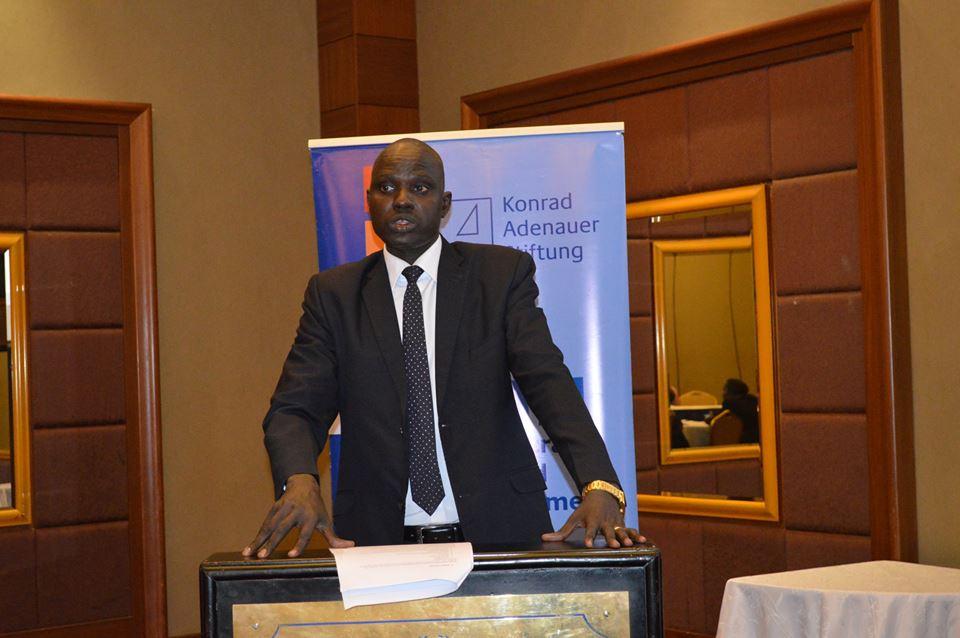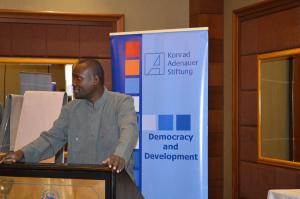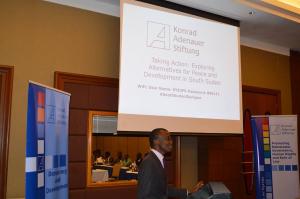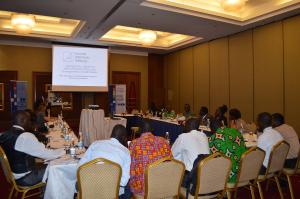Event reports
It is against this background that Konrad Adenauer Stiftung in its commitment to promoting democratic governance, human rights and rule of law convened distinguished academics, media practitioners, peace and security experts and citizens of Uganda and South Sudan on November 7, 2016 for a round table discussion on, “Curbing Corruption and Building Synergies: Exploring Feasible Alternatives for Peace and Development in South Sudan.”
The round table discussion sought to engage civil society actors on the question of South Sudan with specific focus and emphasis on the question of corruption and its effect in the power play and peace equation while broadening the discourse on feasible options for peace and development in the world’s youngest country.
Dr. Daniel Komakech, a peace and conflict expert from Gulu University who was the keynote speaker of the roundtable discussion talked at breadth about corruption in South Sudan in light of the recently released Sentry Report. He criticized the report as couching and building the narrative that there is a nexus between corruption and the crisis in South Sudan and establishing that as a unit of analysis into the conflict.
In so doing, he stressed, the underlying factors fuelling civil war in the country could get lost in this clouded and sweeping narrative. To that end, the corruption narrative propagated by the report portrays graft as, “a unit of analysis for justifying and explaining the current conflict in articulation of corruption as a side situation despite the civil war.” The report, he noted, is too narrow and rigid to facilitate a comprehensive understanding of the complex dynamics of the war. Does corruption embody the crisis we are witnessing or it is a marginal issue? He asked?
Leonie Staas and Marius Hupperich, interns at Konrad-Adenauer-Stiftung Uganda, steered this discussion that took a dive into the economic, diplomatic, military and humanitarian interventions that can come into play. First the picture of the situation at hand was painted. The country currently has 2.5 million refugees since 2013 with a humanitarian crisis since 2012 leaving one in every three persons under acute malnutrition, five million in need of humanitarian aid and at least 50,000-100,000 deaths since 2012.
The last paper which focused on human security in South Sudan was presented by Biel Boutrous Biel, executive director South Sudan Human Rights Society for Advocacy (SSHURSA), who took to the United Nations Development Program definition of human security as safety from chronic threats, hunger and disease. What portends now in South Sudan is a host of human rights violations with deprivation of the basic needs of life, untold suffering in the Internally Displaced Persons’ camp and refugee camps in Uganda.
For relative peace to return he argued, the international community should play a more pronounced role and be more consistent. Part of the role it can play is putting in place a regionally constituted force to bring to a halt the violence against the civilian population. The peace agreement should also be revived and a government of national unity reinstated. In as much as pursuing criminal justice may not be helpful in the short run, there should be a bare minimum level of accountability to put an end to the insanity while other comprehensive options are explored.
In his closing remarks, Mr. Mathias Kamp, the KAS country representative to Uganda pointed out an eight point agenda to overcoming the crisis in South Sudan, each falling either under a short term or long term solution. These include:
1.Containing violence and protection of the civilian population to ensure the deaths end and more are stopped.
2.Address the refugee crisis and humanitarian disaster
3. Configure peace talks by expanding the actors beyond the two leaders and bringing on board elders, women, youth and other citizen formations.
4.Institute an arms embargo by piling pressure and issuing threats to ensure that violence is stopped.
5.Smart and targeted economic sanctions to stifle financial flows
6. Perpetrating justice by prosecuting war crimes and crimes against humanity
7.Create a functional state by among others organizing democratic elections and strengthening institutions as there can’t be sustainable peace and development without people being able to determine their fate.
8.Take a critical look at the economic challenges of the people to ensure they can afford livelihood.
Report compilled by Ivan Okuda from Daily Monitor Newspaper and Donnas Ojok. The event was moderated by Raymond Mujuni, South Sudan Correspondent for NTV-Uganda.
Provided by
Foundation Office Uganda and South Sudan
About this series
The Konrad-Adenauer-Stiftung, its educational institutions, centres and foreign offices, offer several thousand events on various subjects each year. We provide up to date and exclusive reports on selected conferences, events and symposia at www.kas.de. In addition to a summary of the contents, you can also find additional material such as pictures, speeches, videos or audio clips.






